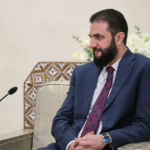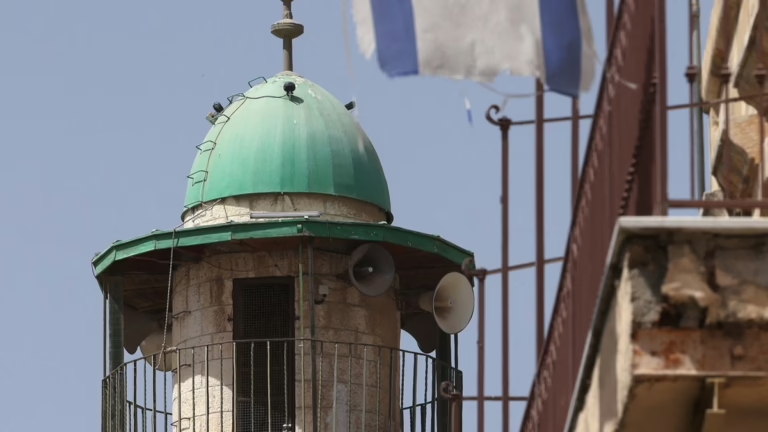West Jerusalem, Israel – Just a couple of blocks away from Prime Minister Benjamin Netanyahu’s residence in West Jerusalem, near the intersection of Balfour and Gaza Streets, lies a modest, unnamed café tucked behind layers of steel barricades and the backdrop of weekly pro-hostage demonstrations. The café hummed with mid-morning conversations.
As news broke that UK Prime Minister Keir Starmer had officially recognized a Palestinian state, some customers glanced up, while others appeared indifferent.
“Naturally, I’m upset,” shared Shira Hazan, 55, a local business owner and longtime Likud supporter. “But what difference does it make? Britain doesn’t bury our soldiers. This is just political posturing while Iran continues to attack us.”
A man seated beside her, like many others in the café, dismissed the announcement with a casual wave, treating it as mere background noise.
“It’s nothing but colonial arrogance,” he muttered, wearing a knitted kippah and barely lifting his eyes from his phone screen.
Although the UK’s recognition of Palestine is not a United Nations General Assembly (UNGA) resolution like Israel’s in 1948, it could trigger a significant ripple effect. This marks the first time a major Western power, which once held the Mandate for Palestine-a League of Nations mandate granted to Britain after World War I to govern the territory now comprising Gaza, the West Bank, and Israel-has formally acknowledged Palestinian statehood.
In a coordinated diplomatic move, Australia and Canada have also extended recognition, increasing pressure on Israel and diverging from the United States’ stance.
This development precedes a special UNGA summit on the Gaza conflict scheduled for Monday. Spearheaded by France and Saudi Arabia, the summit aims to rejuvenate the twogaza-vengeance-overreach/” title=”…: When Vengeance Crosses the Line”>-state solution as the only feasible resolution to the protracted regional conflict.
Countries such as France, Belgium, Luxembourg, and Malta have pledged to join over 145 UN member states that already recognize Palestine.
Political Resistance and Repercussions
Though expected, the declaration of Palestinian statehood sparked immediate and vehement opposition within Israel’s fractured political landscape, with calls for decisive retaliation from various factions.
Far-right Israeli National Security Minister Itamar Ben-Gvir swiftly announced plans to push for the annexation of the occupied West Bank, condemning the recognition as “a reward for the murderous Nukhba terrorists,” referring to the Hamas unit responsible for the October 7, 2023, attack in southern Israel.
He vowed to “completely dismantle the Palestinian Authority” and promised to “propose sovereignty application at the next cabinet meeting.”
The Hostages and Missing Families Forum, an advocacy group campaigning for the release of captives taken to Gaza during the 2023 assault and stationed outside Netanyahu’s Tel Aviv residence for over 740 days, denounced the “unconditional recognition of a Palestinian state while ignoring the plight of 48 hostages still held by Hamas.”
Opposition voices also expressed concern. Benny Gantz, a centrist former defense minister and Netanyahu’s prominent rival, cautioned that the move might strengthen Hamas’s position and hinder efforts to secure the hostages’ freedom.
“Recognizing a Palestinian state post-October 7 only empowers Hamas, prolongs the conflict, diminishes hostage release prospects, and signals support to Iran and its affiliates,” Gantz stated. Addressing Western leaders on X in English, he urged, “If your goal is peace and stability in the Middle East-not yielding to domestic political pressures-then maximum pressure must be exerted on Hamas to relinquish control and free the hostages first.”
Among the few endorsing Starmer’s recognition as “a positive step” is left-wing Israeli lawmaker Ofer Cassif. He criticized the Israeli government’s zero-sum approach, suggesting that recognition could benefit all parties involved.
In January 2024, Cassif signed a petition backing South Africa’s genocide case against Israel at the International Court of Justice, leading to attempts to expel him from the Knesset for allegedly supporting armed struggle; he was ultimately suspended for six months.
“Recognition is an essential initial move toward a just peace, and other nations yet to do so should follow,” Cassif told Al Jazeera. “However, it must not be the final objective. A comprehensive arms embargo on Israel should follow until the government responsible for death and destruction ends the Gaza genocide and dismantles the illegal occupation.”
Regarding further UN interventions, he expressed strong support for deploying peacekeeping forces and reinstating anti-apartheid measures similar to those used in South Africa, including embargoes on weapons and oil.
‘The Worst Possible Timing’
Noam Achimeir, 29, a left-leaning PhD student at Hebrew University in Jerusalem, criticized the timing of the Palestinian statehood recognitions.
“I believe in two states; I’ve marched for peace and debated the occupation with my family for years. But this? It’s the worst possible moment. We’re under missile attacks, families are sheltering, and hostages remain captive. Grand gestures now feel like rewarding those attacking us,” Achimeir said.
Still, he acknowledged that Israel cannot indefinitely control millions of Palestinians.
“Maybe it’s symbolic, but symbols carry weight,” he added. “If Britain recognizes Palestine, perhaps it forces us to confront the reality that this conflict won’t simply disappear.”
Eliyahu Korenman, 42, a religious Zionist from the unauthorized settlement of Shilo north of Jerusalem and a Ben-Gvir supporter, argued that London’s decision “encourages Hamas, Hezbollah, and Iran to continue rocket attacks, hostage-taking, and killing Jews, with the world rewarding them.”
“Every Israeli understands that ‘Palestine’ is synonymous with surrender,” Korenman said. “The timing only confirms our stance: the solution is to hold firm, expand settlements, and demonstrate that we don’t need global approval. The world just doesn’t get it.”
Yael Ben Eshel, 27, a veterinary apprentice from West Jerusalem and Likud voter, was equally dismissive.
“Honestly? It’s irrelevant. Britain hasn’t influenced this region for decades. They can recognize Palestine or the moon-it won’t change anything on the ground,” she told Al Jazeera. “We won’t wake up tomorrow and cede land because of their statements.”
“It’s political theater aimed at immigrants and refugees, so forgive me if I’m not moved by a British declaration,” Ben Eshel added, echoing Netanyahu’s recent remarks blaming Israel’s growing international isolation partly on Western Muslim minorities rather than the deaths of over 65,000 Palestinians in Gaza.
Britain’s Historical Responsibility
This announcement arrives amid escalating military tensions, with the Israeli army recently deploying a third division into Gaza City as part of “Gideon’s Chariots B,” an extension of a months-long offensive that has resulted in hundreds of deaths and a declared famine in the enclave.
Simultaneously, Israel’s hard-right government has taken steps to preempt Palestinian statehood. Finance Minister Bezalel Smotrich recently proposed annexing 82 percent of the occupied West Bank, framing it as a permanent barrier to a two-state solution.
Netanyahu also signed a contentious settlement expansion deal this month, reaffirming his long-standing rejection of Palestinian statehood and asserting, “There will be no Palestinian state; this land belongs to us.”
“Britain laid the groundwork. It promised Arabs freedom if they opposed the Ottomans, then secretly divided the region through the Sykes-Picot Agreement. It made conflicting promises to Jews in the Balfour Declaration and to Arabs elsewhere,” Achimeir remarked, criticizing the UK’s post-World War I policies.
Daniel Darby, 51, an anti-Zionist from Pardes Hanna near Tel Aviv, concurred, calling London’s recognition “a hollow, symbolic act that won’t alter the reality for those suffering in the occupied West Bank and enduring genocide in Gaza.”
“The UK, alongside other European imperial powers, is responsible for the creation of the Zionist state and now bears responsibility for the atrocities in occupied Palestine by providing Israel with reconnaissance, intelligence, and military support,” Darby stated.
He emphasized that recognition without tangible consequences is meaningless.
“Britain cannot absolve itself of its past or responsibility unless it enforces a full arms embargo and comprehensive sanctions against Israel.”
This article is published in partnership with Egab.

















